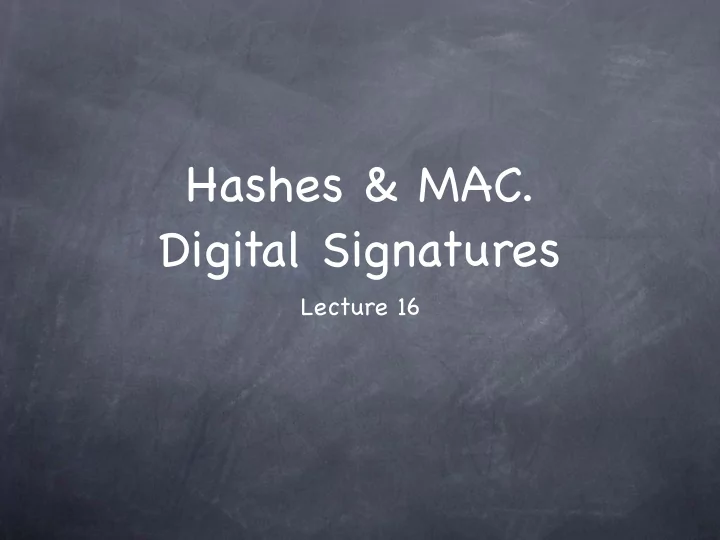

Hashes & MAC. Digital Signatures Lecture 16
One-time MAC With 2-Universal Hash Functions Trivial (very inefficient) solution (to sign a single n bit message): r 10 r 20 r 30 Key: 2n random strings (each k-bit long) (r i0 ,r i1 ) i=1..n r 11 r 21 r 31 Signature for m 1 ...m n be (r imi ) i=1..n Negligible probability that Eve can produce a signature on m’ ≠ m A much more efficient solution, using 2-UHF (and still no computational assumptions): Onetime-MAC h (M) = h(M), where h ← H , and H is a 2-UHF Seeing hash of one input gives no information on hash of another value
MAC With Combinatorial Hash Functions and PRF Recall: PRF is a MAC (on one-block messages) m 1 m t m 2 ⊕ ⊕ CBC-MAC: Extends to any fixed length domain ... F K F K F K Alternate approach (for fixed length domains): T MAC K,h *(M) = PRF K (h(M)) where h ← H , and H a combinatorial hash function (e.g. 2-UHF) Finite domain If truly random function, adversary only learns if hash collision occurred or not (h nor h(M) revealed). Combinatorial hash ⇒ Unlikely collision ever occurs
MAC With Cryptographic Hash Functions A proper MAC must work on inputs of variable length Recall: making CBC-MAC work securely with variable input-length. - Derive K as F K’ (t), where t is the number of blocks - Or, Use first block to specify number of blocks - Or, output not the last tag T, but F K’ (T), where K’ an independent key (EMAC) - Or, XOR last message block with another key K’ (CMAC) Alternate idea: Leave variable input-lengths to the hash But combinatorial hash functions worked with a fixed domain Will use a cryptographic hash function MAC* K,h (M) = MAC K (h(M)) where h ← H , and H a weak-CRHF h(M) may be Weak-CRHFs can be based on OWF . Or, can be more revealed, but efficiently constructed from fixed input-length MACs only oracle access to h
MAC With Cryptographic Hash Functions MAC* K,h (M) = MAC K (h(M)) where h ← H , and H a weak-CRHF Weak-CRHFs can be based on OWF . Or, can be more efficiently constructed from fixed input-length MACs. Unlike the domain extension (to fixed length domain) using 2-UHF , or CBC-MAC, this doesn’ t rely on pseudorandomness of MAC Works with any one-block MAC (not just a PRF based MAC) Could avoid “export restrictions” by not being a PRF Candidate fixed input-length MACs: compression functions (with key as IV) Recall: Compression functions used in Merkle-Damgård iterated hash functions
HMAC HMAC: Hash-based MAC K’’ M Essentially built from a compression m t m 1 |m| function f K 1 IV ... If keys K 1 , K 2 independent (called f f f f NMAC), then secure MAC if: f is a fixed input-length MAC & the K’ K 2 Merkle-Damgård iterated-hash is a IV weak-CRHF f f In HMAC (K 1 ,K 2 ) derived from (K’,K’’), in turn heuristically derived from a T single key K. If f is a (weak kind of) PRF K 1 , K 2 can be considered independent
Hash Not a Random Oracle! Hash functions are no substitute for RO, especially if built using iterated-hashing (even if the compression function was to be modeled as an RO) If H is a Random Oracle, then just H(K||M) will be a MAC But if H is a Merkle-Damgård iterated-hash function, then there is a simple length-extension attack for forgery (That attack can be fixed by preventing extension: prefix-free encoding) Other suggestions like SHA1(M||K), SHA1(K||M||K) all turned out to be flawed too (even before breaking SHA1)
Digital Signatures
Digital Signatures Syntax: KeyGen, Sign SK and Verify VK . Security: Same experiment as MAC’ s, but adversary given VK Sig SK Ver VK s i = Sign SK (M i ) Ver VK (M,s) (M,s) M i VK Advantage = Pr[ Ver VK (M,s)=1 and (M,s) ∉ {(M i ,s i )} ]
Digital Signatures Syntax: KeyGen, Sign SK and Verify VK . Security: Same experiment as MAC’ s, but adversary given VK Secure digital signatures using OWF , UOWHF and PRF Hence, from OWF alone (more efficiently from OWP) More efficient using CRHF instead of UOWHF Even more efficient based on (strong) number-theoretic assumptions e.g. Cramer-Shoup Signature based on “Strong RSA assumption” Efficient schemes secure in the Random Oracle Model e.g. RSA-PSS in RSA Standard PKCS#1
Recommend
More recommend